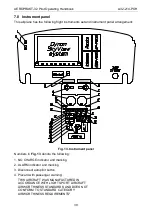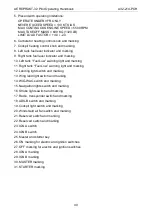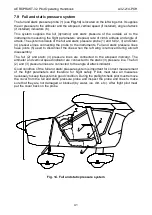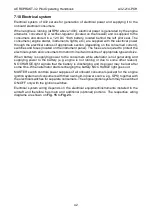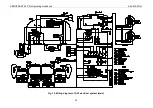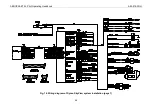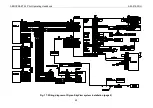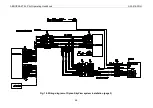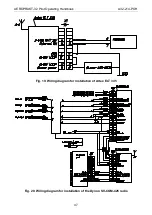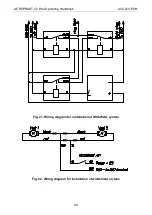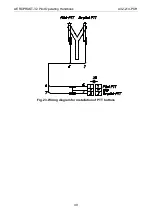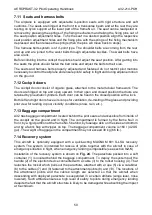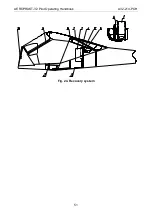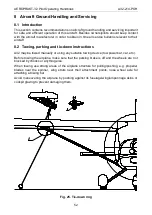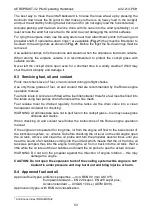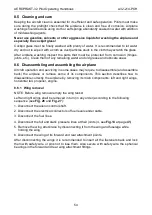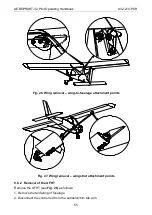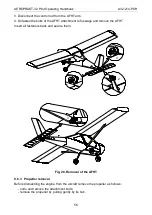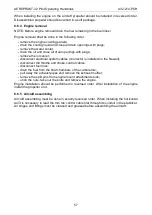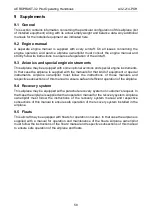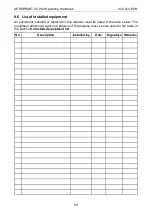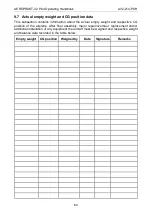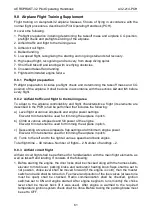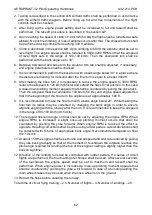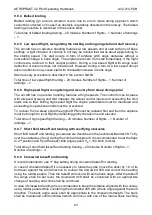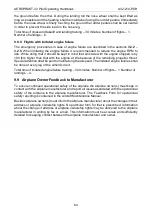
AEROPRAKT-32 Pilot Operating Handbook
A32-214-POH
53
The best way to move the aircraft backward is to raise the nose wheel up by pressing the
tail boom down near the fin (prior to that make sure there is no heavy load in the cockpit)
and pull the aircraft by holding the tail boom and fin (do not apply load the horizontal tail).
Airplane parking and tie-down shall be done with its nose into the wind (preferably) or at
least across the wind but never tail to the wind to avoid damaging the control surfaces.
For tying the airplane down use the wing struts near their attachment points to the wing and
propeller shaft. If optional tie-down rings 1 are available (
Fig. 21
) they must be fitted prior to
tie-down to the wing struts as shown on
Fig. 21
. Before the flight the tie-down rings must be
removed.
Use suitable clamps to fix the ailerons and elevator when the airplane is tied down outside.
When storing the airplane outside it is recommended to protect the cockpit glass with
suitable covers.
Never left the cockpit doors open even for a shortest time in a windy weather! Wind may
shut the door abruptly and damage it.
8.3 Servicing fuel, oil and coolant
Pilots must check level of fuel, oil and coolant during preflight checks.
Use only those grades of fuel, oil and coolant that are recommended by the Rotax engine
operation manual.
Fuel tank inlets in A32 are not fitted with a fuel filter/strainer therefore fuel must be filled into
the tanks using fuel pumps or/and funnels with a fine mesh.
Fuel residue must be drained regularly from the tanks via the drain valve into a clean
transparent container for checking.
WARNING: At all times take care not to spill fuel on the cockpit glass
– fuel may cause glass
dimness and cracks.
When checking oil and coolant level follow the instructions of the Rotax engine operation
manual.
If the engine is not operated for long time, oil from the engine will flow to the lowest point of
the lubrication system, i.e. oil tank. So before checking the oil level on the cold engine open
the oil tank, remove and clean the oil probe and turn the propeller several times until you
hear the sound of air bubbles coming into the oil tank which means that the oil from the oil
tank was pumped thus into the engine forcing the air from it back into the oil tank. Wait a
little while the oil lets out the air bubbles and insert the oil probe to see the actual oil level.
WARNING: Do not turn the propeller against the direction of engine rotation
– this may
damage the engine.
CAUTION: Do not open the expansion tank of the cooling system while engine is hot!
Coolant is under pressure and may burst out and bring injuries or harm.
8.4 Approved fuel and oil
Approved fuel types: antiknock properties
— min. RON 90 (min. AKI 91
2
);
European standard
— EN 228 super, EN 228 super plus;
Aviation standard
— AVGAS 100 LL (ASTM D910).
Approved oil types: with RON 424 classification.
2
Anti Knock Index (RON+MON)/2
Содержание A32-214-POH
Страница 25: ...AEROPRAKT 32 Pilot Operating Handbook A32 214 POH 25 No Equipment description and Part No Weight kg CG arm m...
Страница 29: ...AEROPRAKT 32 Pilot Operating Handbook A32 214 POH 29 Fig 3 Fuel system schematic...
Страница 36: ...AEROPRAKT 32 Pilot Operating Handbook A32 214 POH 36 Fig 10 Engine pre start mixture control...
Страница 43: ...AEROPRAKT 32 Pilot Operating Handbook A32 214 POH 43 Fig 15 Wiring diagram of A32 electrical system main...
Страница 49: ...AEROPRAKT 32 Pilot Operating Handbook A32 214 POH 49 Fig 23 Wiring diagram for installation of PTT buttons...
Страница 51: ...AEROPRAKT 32 Pilot Operating Handbook A32 214 POH 51 Fig 24 Recovery system...

